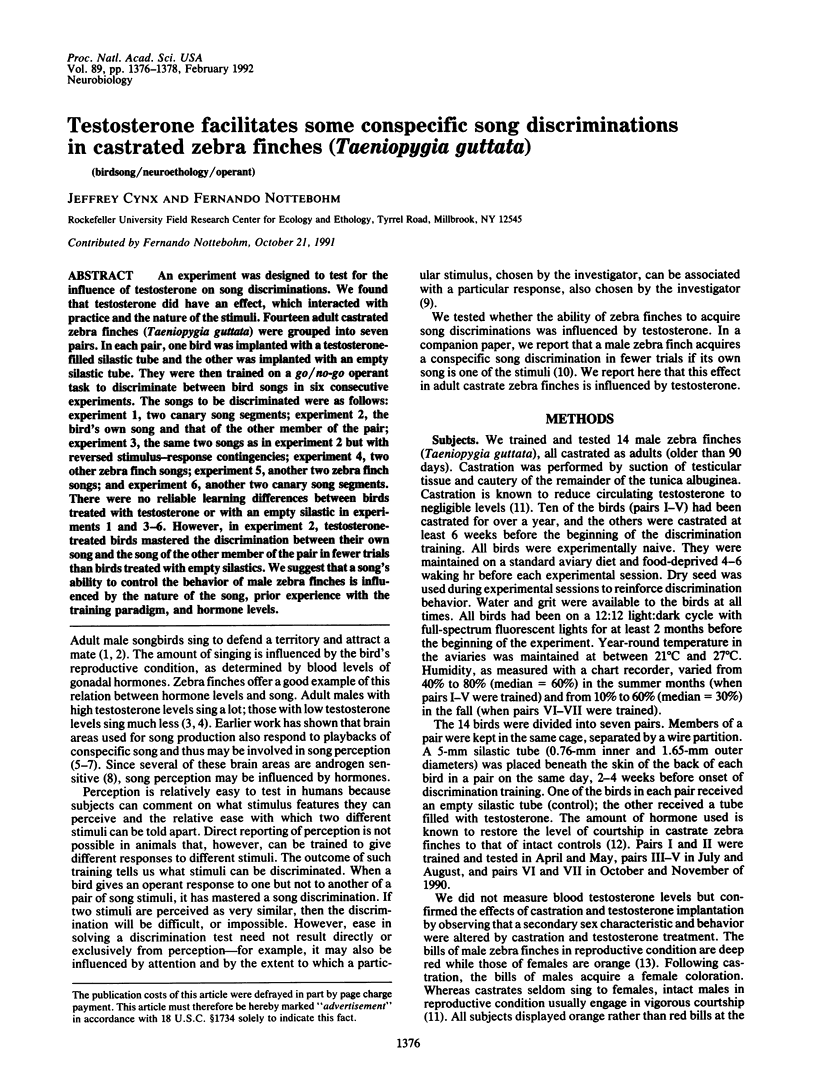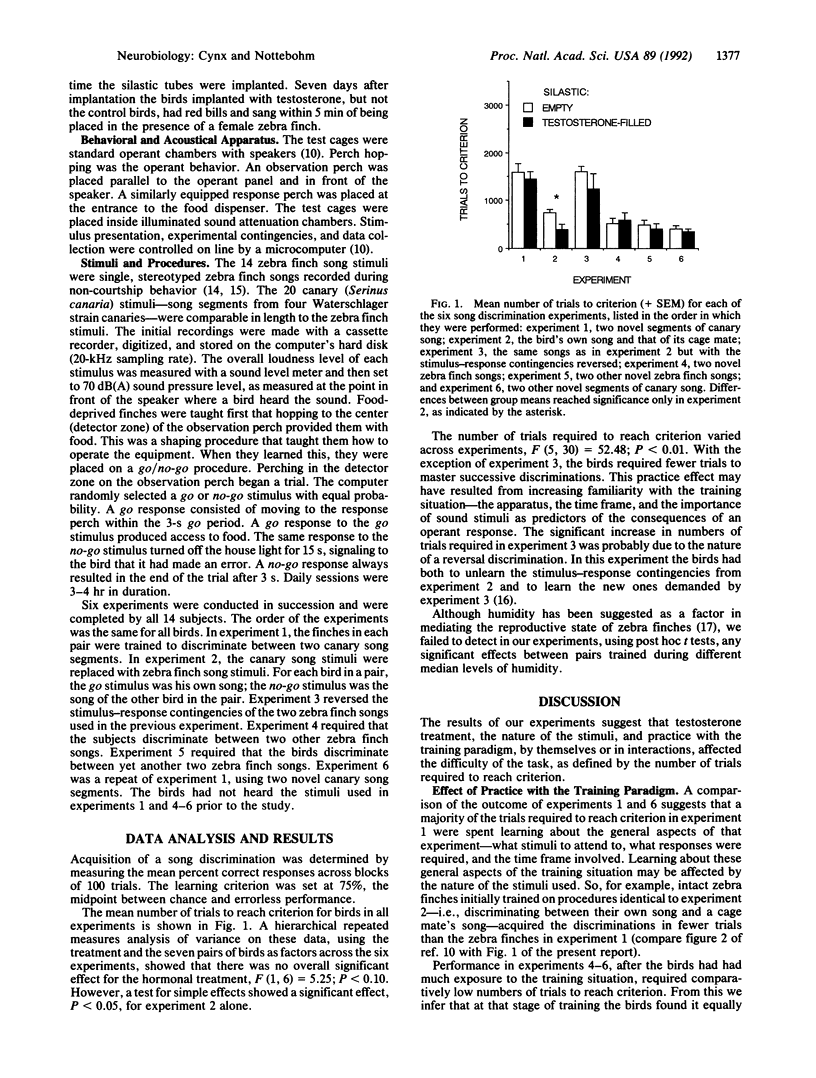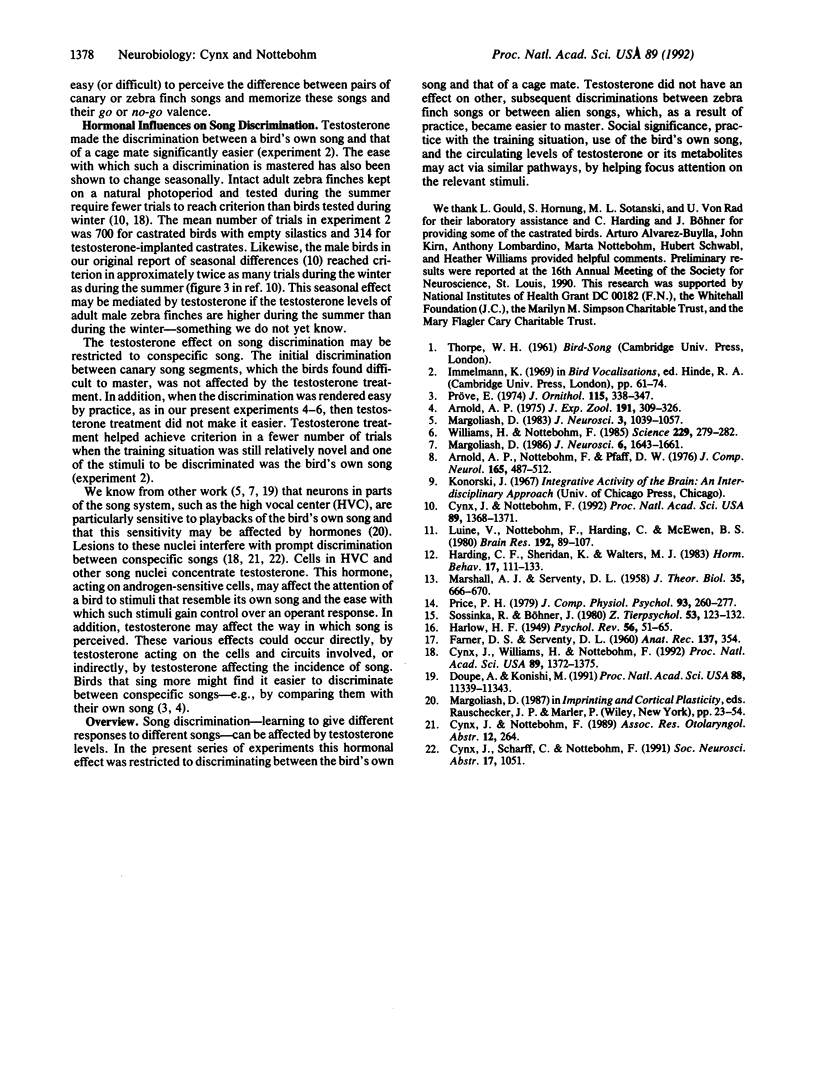Abstract
An experiment was designed to test for the influence of testosterone on song discriminations. We found that testosterone did have an effect, which interacted with practice and the nature of the stimuli. Fourteen adult castrated zebra finches (Taeniopygia guttata) were grouped into seven pairs. In each pair, one bird was implanted with a testosterone-filled silastic tube and the other was implanted with an empty silastic tube. They were then trained on a go/no-go operant task to discriminate between bird songs in six consecutive experiments. The songs to be discriminated were as follows: experiment 1, two canary song segments; experiment 2, the bird's own song and that of the other member of the pair; experiment 3, the same two songs as in experiment 2 but with reversed stimulus-response contingencies; experiment 4, two other zebra finch songs; experiment 5, another two zebra finch songs; and experiment 6, another two canary song segments. There were no reliable learning differences between birds treated with testosterone or with an empty silastic in experiments 1 and 3-6. However, in experiment 2, testosterone-treated birds mastered the discrimination between their own song and the song of the other member of the pair in fewer trials than birds treated with empty silastics. We suggest that a song's ability to control the behavior of male zebra finches is influenced by the nature of the song, prior experience with the training paradigm, and hormone levels.
Full text
PDF


Selected References
These references are in PubMed. This may not be the complete list of references from this article.
- Arnold A. P., Nottebohm F., Pfaff D. W. Hormone concentrating cells in vocal control and other areas of the brain of the zebra finch ( Poephila guttata). J Comp Neurol. 1976 Feb 15;165(4):487–511. doi: 10.1002/cne.901650406. [DOI] [PubMed] [Google Scholar]
- Arnold A. P. The effects of castration and androgen replacement on song, courtship, and aggression in zebra finches (Poephila guttata). J Exp Zool. 1975 Mar;191(3):309–326. doi: 10.1002/jez.1401910302. [DOI] [PubMed] [Google Scholar]
- Cynx J., Nottebohm F. Role of gender, season, and familiarity in discrimination of conspecific song by zebra finches (Taeniopygia guttata). Proc Natl Acad Sci U S A. 1992 Feb 15;89(4):1368–1371. doi: 10.1073/pnas.89.4.1368. [DOI] [PMC free article] [PubMed] [Google Scholar]
- Cynx J., Williams H., Nottebohm F. Hemispheric differences in avian song discrimination. Proc Natl Acad Sci U S A. 1992 Feb 15;89(4):1372–1375. doi: 10.1073/pnas.89.4.1372. [DOI] [PMC free article] [PubMed] [Google Scholar]
- Doupe A. J., Konishi M. Song-selective auditory circuits in the vocal control system of the zebra finch. Proc Natl Acad Sci U S A. 1991 Dec 15;88(24):11339–11343. doi: 10.1073/pnas.88.24.11339. [DOI] [PMC free article] [PubMed] [Google Scholar]
- Harding C. F., Sheridan K., Walters M. J. Hormonal specificity and activation of sexual behavior in male zebra finches. Horm Behav. 1983 Mar;17(1):111–133. doi: 10.1016/0018-506x(83)90021-1. [DOI] [PubMed] [Google Scholar]
- Luine V., Nottebohm F., Harding C., McEwen B. S. Androgen affects cholinergic enzymes in syringeal motor neurons and muscle. Brain Res. 1980 Jun 16;192(1):89–107. doi: 10.1016/0006-8993(80)91011-2. [DOI] [PubMed] [Google Scholar]
- Margoliash D. Acoustic parameters underlying the responses of song-specific neurons in the white-crowned sparrow. J Neurosci. 1983 May;3(5):1039–1057. doi: 10.1523/JNEUROSCI.03-05-01039.1983. [DOI] [PMC free article] [PubMed] [Google Scholar]
- Margoliash D. Preference for autogenous song by auditory neurons in a song system nucleus of the white-crowned sparrow. J Neurosci. 1986 Jun;6(6):1643–1661. doi: 10.1523/JNEUROSCI.06-06-01643.1986. [DOI] [PMC free article] [PubMed] [Google Scholar]
- Williams H., Nottebohm F. Auditory responses in avian vocal motor neurons: a motor theory for song perception in birds. Science. 1985 Jul 19;229(4710):279–282. doi: 10.1126/science.4012321. [DOI] [PubMed] [Google Scholar]



